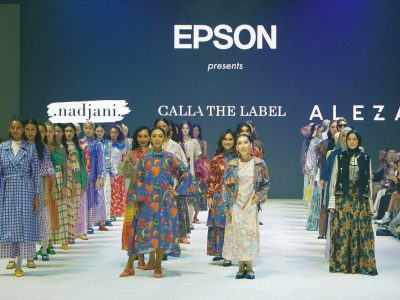Putting the Environment First: How Local SMEs can lighten Singapore’s Environmental Burden
By Siew Jin Kiat, Senior Regional Director, Epson Singapore

A recent survey by the World Wide Fund for Nature (WWF) revealed that the average Singaporean ingests an average of 5 grams of plastic every week – equivalent to a credit card’s worth of plastic. This fact, while shocking, calls timely attention to the mounting environmental issues that as a society, we must acknowledge and address.
With this in mind, Singaporean organisations must firstly accept the role they have played in contributing to these issues – and more importantly, take proactive measures to alleviate these problems before it is too late.
Local Small and Medium Enterprises (SMEs) especially have a part to play in how Singapore handles these issues going forward – with 99 per cent of enterprises in Singapore in 2017 registered as SMEs[1], our local enterprises hold great potential in helping Singapore reduce its collective burden on the planet.
Power Down to Power Up
With 95 per cent of Singapore’s electricity supply generated using natural gas[2], Singapore’s electricity usage is still far from clean. While we explore alternative and cleaner sources of energy, the best action in the immediate future is an overall reduction in power consumption.
One option for local SMEs to streamline their energy use is the choice of hardware that supports business operations such as printers, projectors and other electronic devices. For example, SMEs can consider switching from laser to inkjet printers, which can consume up to 85% less power in the course of normal operations.[3] The use of more energy-efficient technology goes a long way in reducing overall energy usage – as identified by the National Environment Agency (NEA), which has established an Energy Efficiency Fund[4] for SMEs to tap on to improve their use of energy resources.
With 45.9 per cent of Singapore SMEs in 2018[5] reporting that increasing costs had significantly harmed on their business, streamlining energy usage is a good way to reduce operating costs in the long run, as well as being better for the environment.

Taxing Carbon Costs
Singapore’s power usage also negatively impacts our carbon footprint as a whole, and the Singaporean government is already taking steps to reduce carbon emissions. With a primary mitigation strategy of improving energy efficiency, the government has implemented a carbon tax[6] from 2019 onward that starts at S$5 per tonne of greenhouse gases – with plans to increase it to between S$10 and S$15 per tonne of GHG emissions by 2030.
With this looming tax threatening to increase operating costs even further, it is even more imperative for local SMEs to not just reduce their energy usage, but also minimise their carbon footprint. Ecologically friendly choices that SMEs can make include recycling, reducing their use of single-use paper and plastic, and switching to energy efficient business electronics. For instance, printers account for about 10% of a typical office’s power usage, and making a switch to the more energy efficient inkjet models can make a significant difference in the long-term.[7]
Waste Not, Want Not
In addition to our growing power consumption and carbon footprint, Singapore currently faces a waste timebomb – our only landfill site at Semakau is projected to be at maximum capacity by 2035[8]. With Singapore producing 7.7 million tonnes of solid waste in 2018[9] – an amount that has increased by almost two thirds in under two decades, this trajectory must be carefully managed to avoid complications in the future.
To help alleviate this problem, SMEs should incorporate recycling into their business habits, and paper, plastic and e-waste recycling should be part and parcel of regular operations. SMEs should consciously seek out alternatives to reduce waste, such as recycling spent consumables like printer cartridges, or using inkjet printers that contribute to reduced waste compared to laser printers, which will significantly lessen the environmental impact over the lifetime of the printers[10]. In addition, SMEs can also recycle their electronic devices as a way to contribute to environmental conservation. For instance, Epson Singapore works with partners to support the recycling of discarded ink and toner cartridges[11].
While it’s understandable that most SMEs are primarily concerned with the on-going challenge of daily operations, building these environmental practices from the inside out as the company grows allows these issues to be addressed early on – for the financial benefit of the company, as well as the social benefit of Singapore as a whole.

[1] https://www.singstat.gov.sg/
[2] https://www.ema.gov.sg/electricity_market_overview.aspx
[3] Keypoint Intelligence Buyers Laboratory Custom Report (May 2017)
[4] https://www.todayonline.com/business/smes-get-funding-energy-efficient-tech-upgrades
[5] https://www.cpaaustralia.com.au/-/media/corporate/allfiles/document/professional-resources/business-management/small-business-survey/small-business-survey-2018-market-summary-singapore.pdf?la=en&hash=04F038B5003E1EAAA21473168380598DE814D665
[6] https://www.nea.gov.sg/our-services/climate-change-energy-efficiency/climate-change/carbon-tax
[7] Epson research based on data from commissioned survey conducted in March 2018 by SOMPO Risk Management & Health care Inc
[8] https://www.straitstimes.com/singapore/environment/singapores-yearly-waste-weighs-the-same-as-530000-double-decker-buses-and [9] https://www.straitstimes.com/singapore/environment/singapores-yearly-waste-weighs-the-same-as-530000-double-decker-buses-and [11] https://www.epson.com.sg/project-homecoming
Posts You May Like
Get Social With Us



